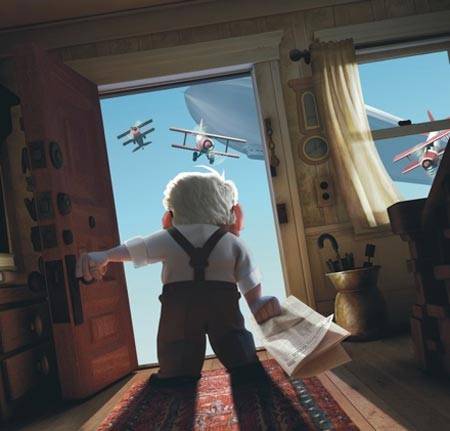 How does Pixar keep doing it?
How does Pixar keep doing it?
Starting in 1995 with Toy Story, they’ve consistently released the best big studio animated features of the last 14 years. Here’s the body count: Toy Story, A Bug’s Life, Toy Story 2, Monster’s Inc., Finding Nemo, The Incredibles, Cars, Ratatouille, Wall-E, and Up.
You would think they would hit a slump at some point, but no, they just keep churning out movies that span from “merely good” (e.g, Cars) to “instant classic” (e.g., Toy Story, The Incredibles, Wall-E, and now Up).
Since the Internet knows everything, I decided to google “Pixar” and “How they do it” to see if it can tell me why. Google does not fail, as http://www.pixar.com/howwedoit/index.html pops up to tell me there is a line in Toy Story that explains it all: You can’t rush art. They’ve released only ten movies in fourteen years. Rather than churn out rushed movies to make a quick buck, they take their time, to make the long but slow buck.
But I have a better answer: What separates a Pixar movie from other animated features is that the story is always primary. They don’t call it a day with whiz-bang animation or some famous actor in a voice role. Pixar movies exist to tell stories about sympathetic and compelling characters.
So a movie about talking toys isn’t about the talking toys, but about the innocence of childhood or the fear of becoming obsolete. A movie about superheroes isn’t about saving the world, but about mid-life crises and not limiting your potential. And a movie about an old man flying away in his house is not about escape, but about acting on your dreams, and where dreams can lead us.
Up begins with perhaps the most touching segment in all of animation. We meet Carl Fredricksen, a young boy infatuated with becoming an adventurer like his newsreel hero, Charles Muntz. Carl meets Ellie, the sunshine to his flower, who is even more infatuated with adventure and life. They grow up, marry, promise each other that someday they will go to Paradise Falls in South America and meet Mr. Muntz. But they can never quite save up enough money, as daily life continues to get in the way. They grow old, and Ellie dies before they can quite get there. Carl is left in their house, which becomes a shrine to Ellie, as the city and progress cages him in from all directions.
We often wonder how cranky old people who cling to their lawns and yell at everyone ever became that way. It’s easy to explain away as simple personality flaw. But Up shows us, right off the bat, why we should have more empathy, since everyone has a backstory.
When Carl is finally made to leave his house, he chooses instead to pump up a few thousands balloons and sail his life right out of the city. He decides to head to Paradise Falls, both as a culmination of a life dream and as a last act of defiance against a world that has conspired against his aspirations.
Then we meet Russell, an Explorer Scout whom Carl had earlier tricked into looking for a snipe under his house. Russell has every badge that can fit on a jacket, except for a hole where his “aiding the elderly” badge should be. He is tenacious at getting his badge and we later find out why, in another touching bit of backstory.
Comic relief comes in the form of dogs with thought-speaking collars. I had believed that all the jokes about dogs being dogs had already been made, but I was wrong. These dogs are funnier by themselves than most Ben Stiller and Seth Rogan movies are in their entirety.
As the plot unfolds, the house and its balloons become a metaphor for our dreams and aspirations in life. Dreams are a necessary escape from our sometimes dreary lives. But pursuing a dream can be costly, as Hank is literally harnessed to his for much of the movie, dragging it through a jungle of complications. And, if you get too obsessed with your dreams, they can sometimes obscure what is even more important. In the end, when a dream is finally achieved, you sometimes wonder what the big deal was all along.
I suppose it’s the journey that makes Pixar films so good. The journey may be the reward, but the irony of taking the journey seriously is that it usually produces a good reward at the end. Pixar has embraced this paradox, and, along with creating solid stories and lovable characters, they continue to find the end result of producing great mainstream movies.








